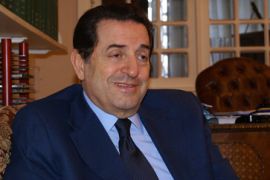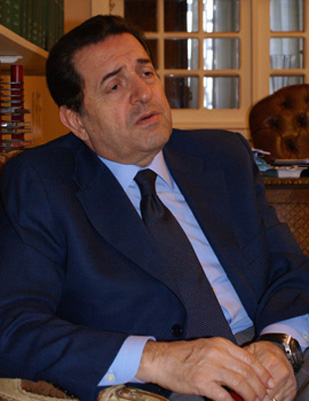Interview: Boutros Harb
The Lebanese MP that the parliamentary majority would like to see as president.

 |
| Harb says he fears for his life every day he goes to work |
A day before a deadline to select a new Lebanese president, Al Jazeera speaks to Boutros Harb, an MP whom the majority March 14 bloc would like to see succeed Emile Lahoud.
AJ: How would you describe the mood in the March 14 camp at the moment, bearing in mind that you are one of their preferred candidates for the presidency?
Harb: The mood of the March 14 group is the mood of the Lebanese. We are disappointed and we hoped to change the style and the behaviour on how to elect a president.
We had on our mind that this time we would be able as Lebanese to follow up the procedure in the constitution and elect a president who meets our ambitions and who could come with a programme to rebuild the country and make reforms.
Unfortunately, what is happening now is that we have the feeling that it is not up to the Lebanese to decide, in spite of the withdrawal of the Syrian troops from Lebanon [in 2005] and the end of the so-called Syrian tutelage over Lebanon.
We [March 14] have the feeling that we didn’t really achieve and we didn’t see the finish of our mission in restoring Lebanese sovereignty and consolidating our independence.
We are affected by the positions of Syria, Iran, Saudi Arabia, Egypt, France, Europe and the United States, which gives us the impression that our dream of being capable of deciding our future is not so clear.
How realistic do you think it is to have a consensus candidate?
I need to explain to you that it was not our intention to force the election into a compromise or a consensus. Our ambition was to be able to implement our constitution – to go to the parliament, let all the candidates run and let the best win, which is the most simple and the most honest way of practising our rights.
| Special report |
Unfortunately, because of the elements I mentioned earlier, we were under obligation to go towards this process of reaching consensus.
Personally, I think now the chances of a consensual president are diminishing and the possibility of not agreement on one person is increasing.
I think the country is agreed on not going towards confrontation and that we must try more efforts to convince the opposition to go to the parliament to elect.
This I doubt, because I do not think the [March 8] opposition is ready to abide by the constitution and the rules of democracy.
I do not argue with parliamentarians who say “we have the right to be absent [from parliamentary voting sessions] as we have the right to be present”, but we all have the obligation to avoid a power vacuum and pushing the country towards paralysis, jeopardising [Lebanese] unity.
If the opposition agreed to abide by the principles of democracy I think the Lebanese would not need the intervention of the French or anyone else to help find a peaceful resolution.
But Lebanon is at such an impasse now that if the rival camps do not reach consensus and the majority decide to hold their own parliamentary session and elect a president by a simple majority it would destabilise Lebanon.
We agree in the March 14 Forces not to go ahead and elect by a simple majority. We do not want to push the country in a more complicated direction.
So if no agreement is reached – and you say the chances of that are “diminishing” at the moment – what will happen?
| At the moment I go to work and wonder if I will come home, such is the fear of assassination” |
We have a constitution that stipulates what can happen. The constitution says that the powers of the president will go to the government. Not to the prime minister – the government. Awaiting the election of a new president, things will be normal.
We know we are from the majority and we agreed to the government that no big measures or important decisions [would] be taken during this transitory period … unless it is urgent. We want to avoid any clashes.
We want to emphasise that we do not want the government to practise the powers of the president because we are in a very tense equilibrium in this country. Some Christians feel that it is against the right of the government to take the powers of the presidency [which is reserved for a Maronite Christian] – should that happen.
We are asking for the political role of the Christians to be preserved. At the same time we see some Christians working with the opposition to see a vacuum in the presidency and who forbid the parliament to meet to elect a president.
So you are saying that the government would assume the powers of the presidency only as a last resort?
Yet, barring other solutions.
But March 8 is not going to accept that.
We the March 14 are not supportive of it either, especially the Christians of March 14. We are not deciding on that course of action – the constitution decides that.
So does March 14 feel that March 8 is taking away its right to select the candidate it wants for the presidency?
It is the right of the minority to try to avoid the majority from electing a president. It is their democratic right. What I cannot accept is that, in doing so, they are putting the country in a vacuum, which can backfire and create an explosive situation.
The people of Lebanon are pessimistic are worrying that nothing will be worked out and they have very little faith in the political system at the moment.
| Interview |
|
|
I can understand how people are feeling because they have suffered since 1975 [the beginning of Lebanon’s civil war]. They are afraid for the future.
They are seeing all the countries of the Middle East develop and they want economic growth that could permit the Lebanese people to live together.
Now we are seeing lots of families split up because lots of young people who train and study here cannot find work and go to other countries.
This affects all the Lebanese society negatively.
But people here should know that we as politicians are not continuing this struggle for our own self-interest or to win personally.
At the moment I go to work and wonder if I will come home, such is the fear of assassination.

